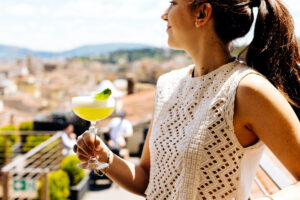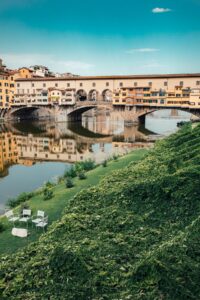Last Updated on January 19, 2026 by Emma Fajcz | Published: April 27, 2022
We usually assume that “sustainable travel” means eco-friendly travel—and that’s true. But sustainability also means making sure the travel experiences we get to have today are still available for future generations. That also includes things like making sure the locals can still afford rent, and that the shops selling unique made-in-Florence crafts outnumber cheap, mass-produced souvenir shops. Here’s our complete guide to sustainable travel in Florence so you can help make sure that Florence stays Florence.
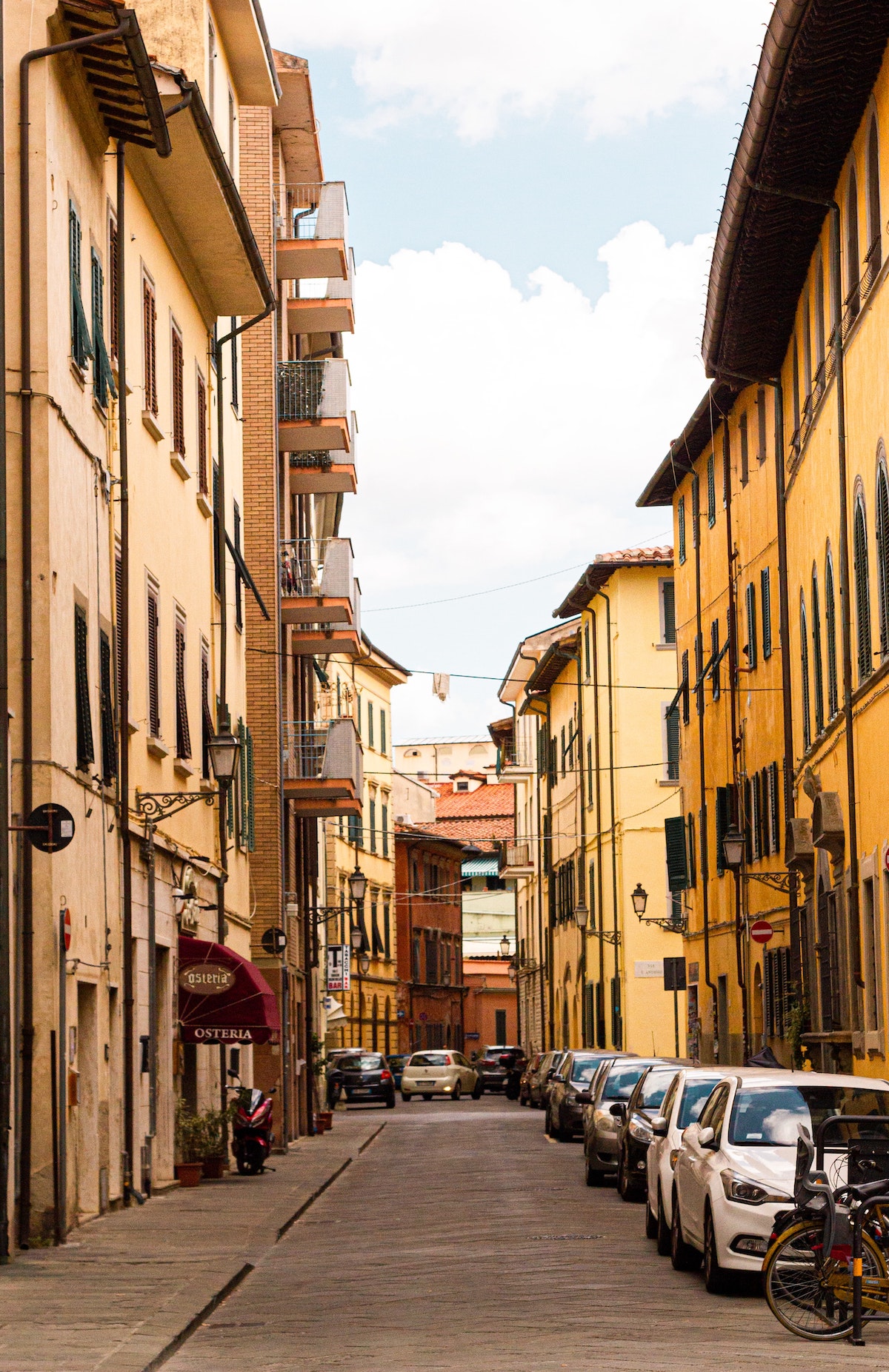
Some cities, like Lisbon, have reached a breaking point from overtourism. Even though the pandemic was a massive reset button for the travel industry worldwide, we need to keep sustainability in mind if we’re to avoid over-tourism in Florence and everywhere else.
It’s not all doom and gloom, though! The good news is that it can be really easy to make your visit to Florence more sustainable in all senses of the word, from planning an off-season trip to finding out what foods are local to learning the city’s recycling bin color-coding. Here are some sustainable travel tips to get you started!
When to Go to Florence
The “high season” in Florence has grown substantially, now stretching from April through October. You may think you’re being clever by planning a November trip—until you get there and find large groups of Italian kids on field trips from school. In other words, Florence is busy nearly all year.
There are, however, a few months when Florence isn’t as busy. The “low season” is roughly from November through March, with the exception of the Christmas and New Year’s holidays. The weather is often colder, yes, but you’ll be able to experience a city that isn’t bursting at the seams—which is often easier on your wallet and good for the city, too.
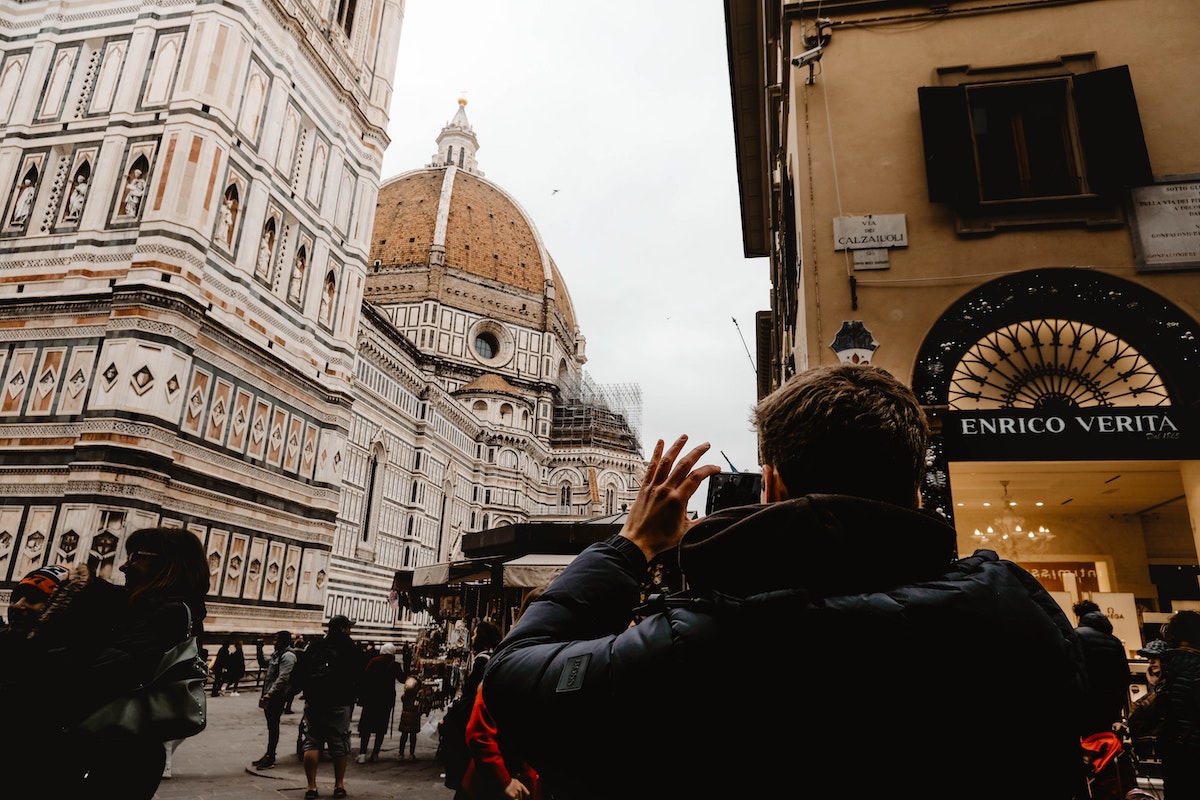
Getting Around
Florence is made for walking. With notable exceptions (like the hill in the Oltrarno that takes you up to Piazzale Michelangelo, San Miniato al Monte, and points beyond), Florence is predominantly flat. Staying in the historic core means you’re a short walk away from most everything on your must-see list.
Florence is also one of the Italian cities that has a ZTL, or “Limited Traffic Zone,” and cars without a ZTL permit aren’t allowed to drive through them at any time. (If you’ve ever wondered why Florence is so pedestrian-friendly, this is the reason.) Rental cars don’t come with a ZTL permit, and don’t think your rental car company won’t pass fines along to you if you drive through one anyway—there are cameras all over them.
Don’t want to walk? The main train station is located in the city center, closer to the big sights than in many cities, so luckily you don’t need to bother with a rental car. You may even be able to walk to your lodging from the station.
Florence was also an early adopter of the RideMovi e-bike rentals. With the RideMovi app, it’s easy to rent e-bikes in cities all over Italy, including Florence, if you’d like to explore a bit more on two wheels.
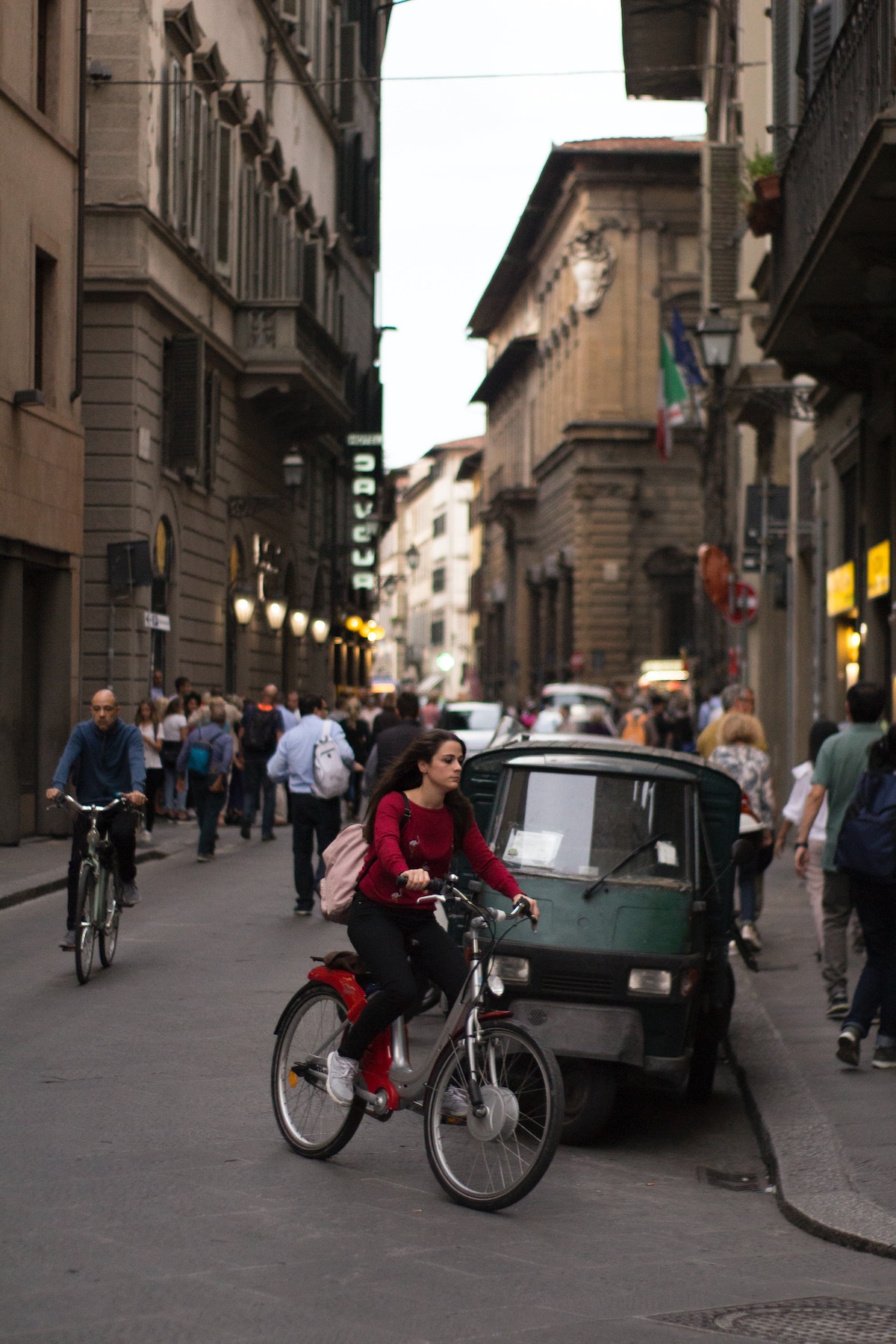
Accommodation
We all love the luxury of renting an apartment in the heart of a city when we travel, but we are also becoming increasingly aware of how locals can no longer afford (or even find) places to live because of sites like Airbnb. However, most of us may not be eager to book a stay in a cookie-cutter chain hotel.
- Luckily, there are plenty of small, family-run hotels and B&Bs in Florence, and the vast majority have websites so you can book with them directly.
- Don’t overlook the hostels, either. Most of them are no longer just for backpacking students, and many even have private rooms.
- There are also some guest houses where the owner lives on the premises and rents out a room or two. These allow you to get a peek at life as a local while helping someone afford their city center home at the same time.
- Need specific recommendations? Here are a few of our favorite places to stay in different neighborhoods in Florence.
No matter where you stay, there are a few things you can do to minimize your impact on Florence:
- Don’t have your towels and sheets changed daily. If there isn’t a note explicitly stating this as an option, you can always hang the “do not disturb” sign on the door.
- Don’t leave things plugged in to charge while you’re out all day. Electricity in Italy is significantly more expensive than it is in North America.
- Separate trash so things like glass and paper can be easily recycled by hotel staff.

What to Do in Florence
We’ve all seen people at museums who take pictures when they’re not supposed to, right? In many cases, rules like that aren’t just about getting you to buy postcards in the museum shop—they’re about preserving the art. Not only can the flash damage artwork over time, but if you’re paying too much attention to what’s on your phone then you’re more apt to bump into a sculpture. Don’t get us started on the folks who climb on statues to get a selfie only to break them!
Following the rules laid out by an attraction is always the respectful way to go. If a sign tells you not to go into a certain area or stray from the path, it may be for your own safety and it may be to keep the damage caused by crowds and foot traffic limited.
And while no Florence attraction is truly “undiscovered,” try visiting a few of Florence’s hidden gems between stops at the city’s main sights. This helps thin the crowds at the main attractions a bit.
An awareness campaign launched by the city helps educate visitors about certain behaviors that are prohibited (and for which you can be fined). Things like sitting to eat on the steps of a church, climbing on monuments, and buying knock-off designer bags from street vendors are just some of the things on this list.
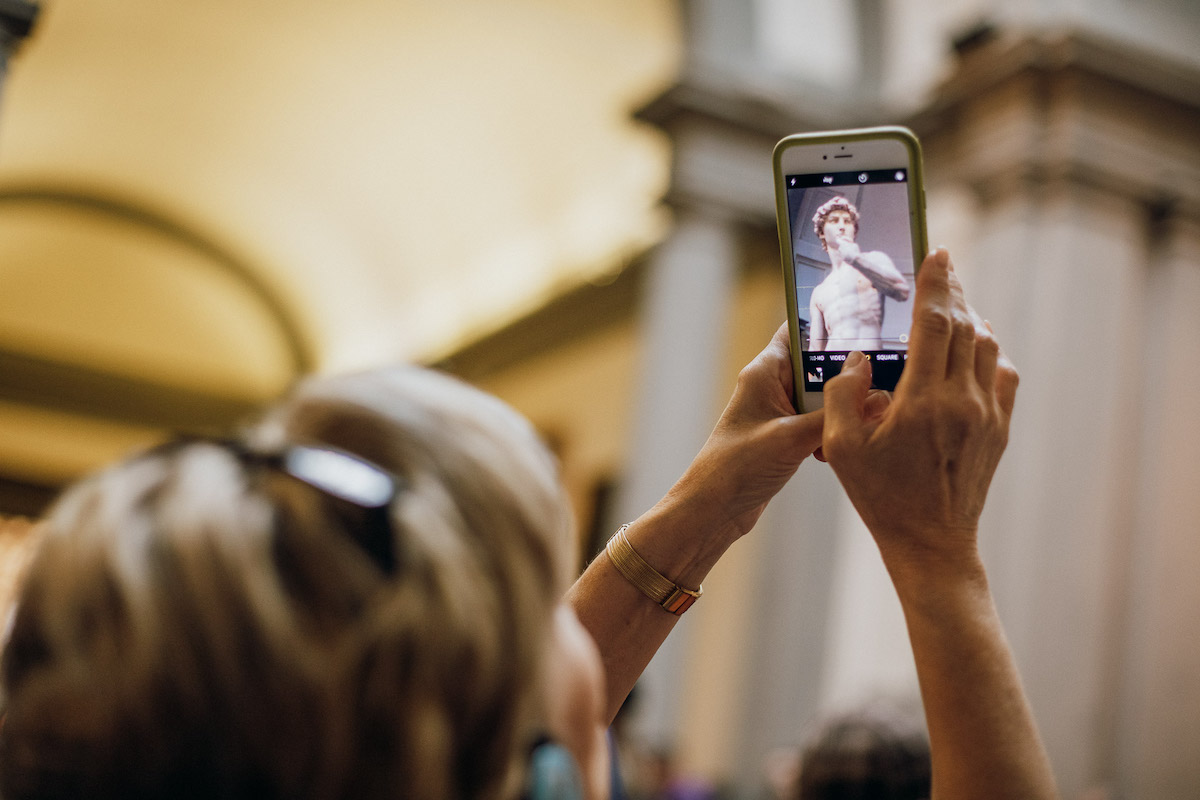
What to Eat in Florence
When it comes to food, being a responsible traveler in Italy is easy. Eating what’s local and seasonal isn’t just a sustainable choice—it’s the most delicious option.
Italian food is incredibly regional, as well, so by learning what ingredients and dishes Florence is especially known for, you’re getting a bit of a cultural education in Tuscany’s culinary history. If you’re not sure what’s in season, wander through an outdoor food market or Florence’s huge Mercato Centrale (a tourist destination of its own) to see what fruits and veggies are in profusion at multiple stalls.

Be a Good Guest
So much of being a responsible traveler is, we think, akin to being a good houseguest. In Florence, that means:
- Be respectful. Remember that you might think of a church as a tourist attraction, but for some of the locals it’s a place of worship—and, no matter your beliefs, it’s a sacred space to someone. So, even if it’s summer, you’ll need to dress appropriately (for example, keep shoulders covered).
- Don’t overindulge. Italians enjoy their wine, but they rarely get drunk in public. Have a glass or two with your meal if you like, but don’t be one of the obnoxiously drunk visitors shouting in a residential area in the middle of the night.
- Recycle. There are color-coded recycling bins throughout the city—yellow for paper, green for glass, and so on. They may not be as ubiquitous as trash cans, but try to find a place with recycling options instead of just throwing things away.
- Carry a reusable water bottle. Staying hydrated is always a good idea, and there are ways of doing it that don’t include buying countless disposable plastic bottles. Florence’s tap water is safe to drink, and there are even public fountains where you can refill your bottle.
Follow these tips, and you can leave Florence knowing you’ve been a great tourist. Are you visiting Rome on your time in Italy? Don’t miss our guide to sustainable tourism in Rome.
Tour Florence Sustainably with an Expert Local Guide
Want to taste the best cuisine in Florence while supporting small family-owned businesses? Save a spot on our Florence Food and Wine Tour! One of our expert local guides will take you to the easily-overlooked places where the Florentines eat. You’ll enjoy artisan charcuterie, local pasta, and a sizzling bistecca alla Fiorentina, then you’ll sip prosecco through a centuries-old wine window and learn the secrets of the best negroni.
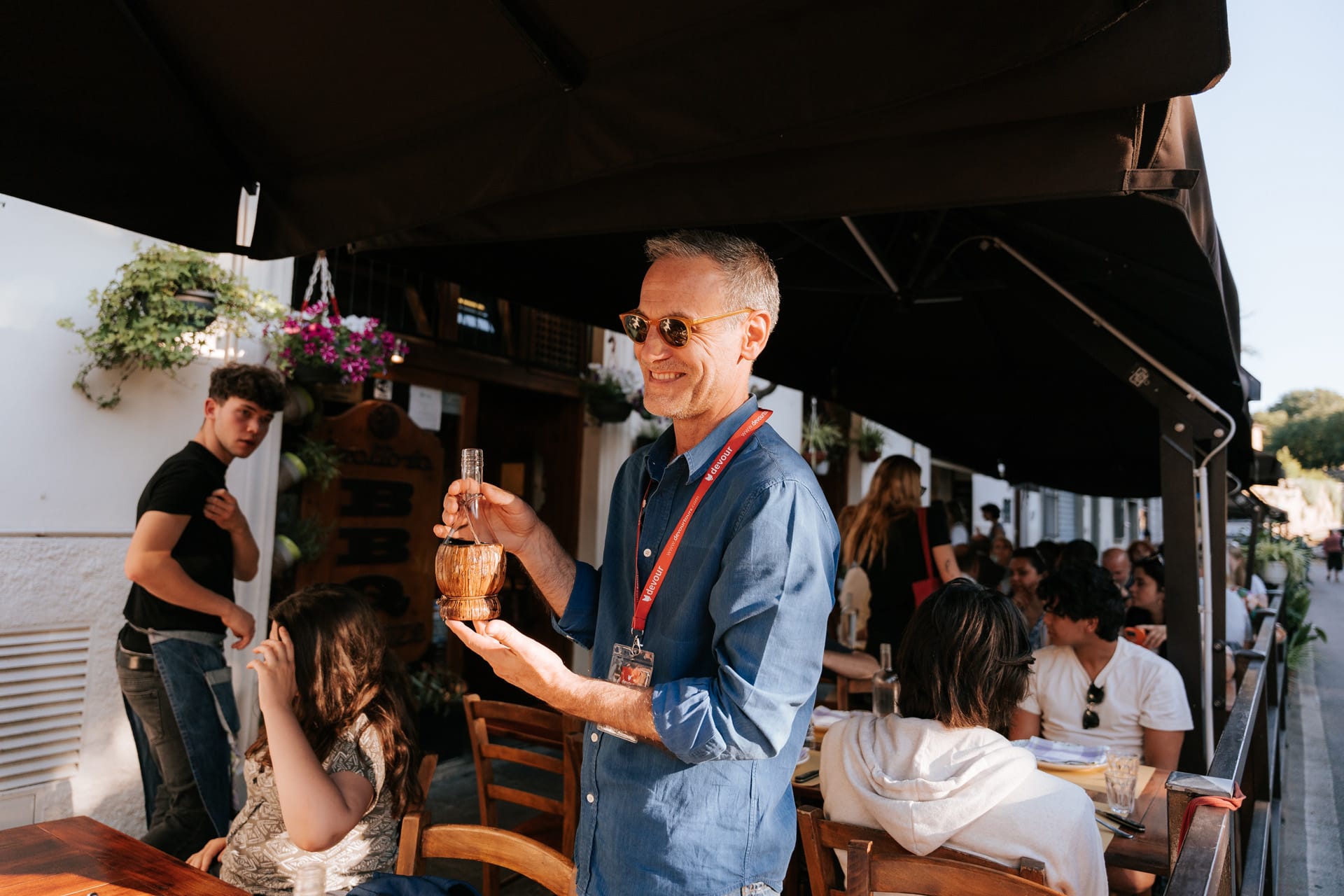
Featured Review: Florence Food and Wine Tour
⭐️⭐️⭐️⭐️⭐️ “Marilisa was INCREDIBLE, very knowledgeable, funny and truly made it a personal experience… she took us to some amazing spots…. Don’t miss this tour!!!!”
– Laura on Viator
Sustainable Tourism in Florence FAQs
What does sustainable tourism look like in Florence?
Sustainable tourism in Florence means choosing experiences that reduce environmental impact, supporting local businesses, and respecting local culture. This includes walking or using public transportation, visiting less-crowded neighborhoods and attractions, eating at locally owned restaurants, and choosing tours that prioritize ethical practices and community benefit.
Are there sustainable tours and experiences in Florence?
Yes. Many local operators, like here at Devour, offer small-group walking tours, bike tours, and food tours that emphasize sustainable practices, such as supporting local producers, using seasonal ingredients, and limiting waste. Here at Devour, we prioritize responsible tourism and partner with many local businesses and family-owned restaurants.
What are some sustainable ways to enjoy Florence’s art and culture?
To enjoy Florence sustainably, consider visiting less crowded museums during off-peak hours, booking timed-entry tickets to reduce lines, and supporting local artisans and workshops rather than only buying mass-produced souvenirs. Also, seek out cultural experiences that benefit local communities, like neighborhood food markets or family-run studios.
How can I support local communities while traveling in Florence?
You can support local communities by dining at neighborhood trattorias, buying from artisan shops and markets, choosing locally owned accommodations, and participating in tours that give back to the community.

